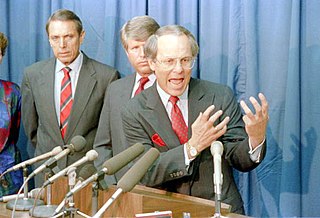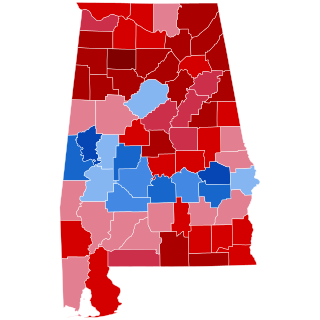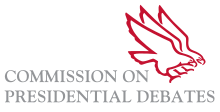
During presidential election campaigns in the United States, it has become customary for the candidates to engage in one or more debates. The topics discussed in the debate are often the most controversial issues of the time, and arguably elections have been nearly decided by these debates. Candidate debates are not constitutionally mandated, but they are now considered an intrinsic part of the election process. The debates are targeted mainly at undecided voters; those who tend not to be partial to any political ideology or party.
The Citizens' Debate Commission (CDC) is a nonpartisan American organization, formed in 2004, that was established to sponsor future general election presidential debates.

Frank J. Fahrenkopf Jr. is an American attorney, political executive, and lobbyist who was chairman of the Republican National Committee from 1983 to 1989. Fahrenkopf is co-founder, and currently co-chairman, of the Commission on Presidential Debates, which conducts the United States general election presidential and vice presidential debates. In the private sector, Fahrenkopf most recently served as the American Gaming Association's first president, and retired from the position in 2013.
The United States presidential election debates were held during the 2000 presidential election. Three debates were held between Republican candidate, Texas Governor George W. Bush and Democratic incumbent Vice President Al Gore, the major candidates. One debate was held with their vice presidential running mates, Dick Cheney and Joe Lieberman. All four debates were sponsored by the non-profit Commission on Presidential Debates (CPD), which has organized presidential debates since its establishment in 1987.
The United States presidential election debates were held during the 1996 presidential election. Two debates were held between Republican candidate, Senate Majority Leader Bob Dole and Democratic incumbent President Bill Clinton, the major candidates. One debate was held with their vice presidential running mates, Jack Kemp and Al Gore. All three debates were sponsored by the non-profit Commission on Presidential Debates (CPD), which has organized presidential debates since its establishment in 1987.

The 2020 United States presidential election in Alabama took place on Tuesday, November 3, 2020, as part of the 2020 United States presidential election in which all 50 states and the District of Columbia participated. Alabama voters chose nine electors to represent them in the Electoral College via a popular vote pitting incumbent Republican President Donald Trump and his running mate, incumbent Vice President Mike Pence, against Democratic challenger and former Vice President Joe Biden and his running mate, United States Senator Kamala Harris of California. Also on the ballot was the Libertarian nominee, psychology lecturer Jo Jorgensen and her running mate, entrepreneur and podcaster Spike Cohen. Write-in candidates were permitted without registration, and their results were not individually counted.

The 2024 United States presidential election will be the 60th quadrennial presidential election, set to be held on Tuesday, November 5, 2024. Voters in each state and the District of Columbia will choose a slate of electors to the U.S. Electoral College, who will then elect a president and vice president for a term of four years.
This is a timeline of major events leading up to, during, and after the 2024 United States presidential election. This will be the first presidential election to be run with population data from the 2020 census. In addition to the dates mandated by the relevant federal laws such as those in the U.S. Constitution and the Electoral Count Act, several milestones have consistently been observed since the adoption of the conclusions of the 1971 McGovern–Fraser Commission.
The following is a timeline of major events leading up and during the 2020 United States presidential election, the 59th quadrennial United States presidential election, from January to October 2020. For previous events, see Timeline of the 2020 United States presidential election (2017–2019). For subsequent events, see Timeline of the 2020 United States presidential election

The 2024 United States presidential election in Arizona is scheduled to take place on Tuesday, November 5, 2024, as part of the 2024 United States elections in which all 50 states plus the District of Columbia will participate. Arizona voters will choose electors to represent them in the Electoral College via a popular vote. The state of Arizona has 11 electoral votes in the Electoral College, following reapportionment due to the 2020 United States census in which the state neither gained nor lost a seat. Arizona is considered to be a crucial swing state in 2024.

The 2024 United States presidential election in California is scheduled to take place on Tuesday, November 5, 2024, as part of the 2024 United States elections in which all 50 states plus the District of Columbia will participate. California voters will choose electors to represent them in the Electoral College via a popular vote. California has 54 electoral votes in the Electoral College, the most in the country.

The 2024 United States presidential election in Florida is scheduled to take place on Tuesday, November 5, 2024, as part of the 2024 United States elections in which all 50 states plus the District of Columbia will participate. Florida voters will choose electors to represent them in the Electoral College via a popular vote. The state of Florida has 30 electoral votes in the Electoral College, following reapportionment due to the 2020 United States census in which the state gained a seat.

The 2024 United States presidential election in Georgia is scheduled to take place on Tuesday, November 5, 2024, as part of the 2024 United States elections in which all 50 states plus the District of Columbia will participate. Georgia voters will choose electors to represent them in the Electoral College via a popular vote. The state of Georgia has 16 electoral votes in the Electoral College, following reapportionment due to the 2020 United States census in which it neither gained nor lost a seat. Georgia is considered to be a crucial swing state in 2024.

The 2024 United States presidential election in Michigan is scheduled to take place on Tuesday, November 5, 2024, as part of the 2024 United States elections in which all 50 states plus the District of Columbia will participate. Michigan voters will choose electors to represent them in the Electoral College via a popular vote. The state of Michigan has 15 electoral votes in the Electoral College, following reapportionment due to the 2020 United States census in which the state lost a seat. Michigan is considered to be a crucial swing state in 2024.

The 2024 United States presidential election in Nevada is scheduled to take place on Tuesday, November 5, 2024, as part of the 2024 United States elections in which all 50 states plus the District of Columbia will participate. Nevada voters will choose electors to represent them in the Electoral College via a popular vote. The state of Nevada has six electoral votes in the Electoral College, following reapportionment due to the 2020 United States census in which the state neither gained nor lost a seat.

The 2024 United States presidential election in North Carolina is scheduled to take place on Tuesday, November 5, 2024, as part of the 2024 United States elections in which all 50 states plus the District of Columbia will participate. North Carolina voters will choose electors to represent them in the Electoral College via a popular vote. The state of North Carolina has 16 electoral votes in the Electoral College, following reapportionment due to the 2020 United States census in which the state gained a seat.

The 2024 United States presidential election in Pennsylvania is scheduled to take place on Tuesday, November 5, 2024, as part of the 2024 United States elections in which all 50 states plus the District of Columbia will participate. Pennsylvania voters will choose electors to represent them in the Electoral College via a popular vote. The state of Pennsylvania has 19 electoral votes in the Electoral College, following reapportionment due to the 2020 United States census in which the state lost a seat.

The 2024 United States presidential election in Texas is scheduled to take place on Tuesday, November 5, 2024, as part of the 2024 United States elections in which all 50 states plus the District of Columbia will participate. Texas voters will choose electors to represent them in the Electoral College via a popular vote. The state of Texas has 40 electoral votes in the Electoral College, following reapportionment due to the 2020 United States census in which the state gained two seats.

The 2024 United States presidential election in Wisconsin is scheduled to take place on Tuesday, November 5, 2024, as part of the 2024 United States elections in which all 50 states plus the District of Columbia will participate. Wisconsin voters will choose electors to represent them in the Electoral College via a popular vote. The state of Wisconsin has 10 electoral votes in the Electoral College, following reapportionment due to the 2020 United States census in which the state neither gained nor lost a seat.
The first general election debate between the major candidates of the 2024 United States presidential election was sponsored by CNN and attended by presumptive Democratic nominee Joe Biden and presumptive Republican nominee Donald Trump on June 27, 2024. Biden withdrew from the race in July, and was replaced by Kamala Harris, while Trump became the official Republican nominee that same month. The second debate, which will be sponsored by ABC, is scheduled to be held on September 10, 2024.















